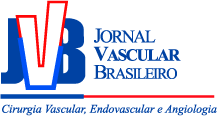Veias linfonodais: uma causa pouco conhecida de varizes
Lymph node veins: a little-known cause of varicose veins
André Paciello Romualdo; Roberto de Moraes Bastos; Alessandro Cappucci; Mathias Fatio; Andréa Tsunoda; Pollyanna Campos; Alberto Lobo Machado; Eduardo Hideki Tokura
Resumo
Palavras-chave
Abstract
Keywords
References
Caggiati A, Bergan J, Gloviczki P. Nomenclature of the veins of the lower limbs: an international interdisciplinary consensus statement. J Vasc Surg. 2002;36:416-22.
Caggiati A, Bergan J, Gloviczki P. Nomenclature of the veins of the lower limbs: Extensions, refinements, and clinical application. J Vasc Surg. 2005;41:719-24.
Cavezzi A, Labropoulos N, Partsch . Duplex ultrasound investigation of the veins in chronic venous disease of the lower limbs-UIP consensus document: Part II. Anatomy. VASA. 2007;36:62-71.
Lemasle P, Uhl F, Lefrebve-Vilardebo M, Baud J, Gillot C. Veines lynpho-ganglionnaires inguinales: Aspects anatomiques et écographiques. Consequences sur la definition de la neogenese. Consequences therapeutiques. Phlebologie. 1999;52:263-269.
Guarrido M. A crossa da veia safena magna, estudo anatômico e correlação médico-cirúrgica. .
Kohler A, Dirsch O, Brunner U. Veno-lymphatic angiodysplasia as the cause of recurrent inguinal varicose veins. VASA. 1997;26:52-4.
Franco G. La néovasculogenèse existe-t-elle?: Récidives variqueuses post-chirurgicales. Point de vue d"um explorateur. Actualités Vasculaires Internat. 1992;1:41-3.
Franco G, Nguyen K. Apport de l"echo-Doppler dans les récidives variqueuses post-opératoires au niveau de la région inguinale. Phlébologie. 1995;48:241-50.
Franco G. Exploration ultrasonographiche des récidives variqueuses post-chirurgicales. Phlébologie. 1998;51:403-13.
França GJ, Timi JRR, Vidal EA, Oliveira A, Secchi F, Miyamotto M. O eco-Doppler colorido na avaliação das varizes recidivadas. J Vasc Bras. 2005;4:161-6.
Chandler JG, Pichot O, Sessa C, Schuller-Petrovi¢ S, Osse FJ, Bergan JJ. Defining the role of extended saphenofemoral junction ligation: a prospective comparative study. J Vasc Surg. 2000;32:941-53.
Fischer R, Linde N, Duff C, Jeanneret C, Chandler JG, Seeber P. Late recurrent saphenofemoral junction reflux after ligation and stripping of the greater sphenous vein. J Vasc Surg. 2001;34:236-40.
Dwerryhouse S, Davies B, Harradine K, Earnshaw JJ. Stripping the long saphenous vein reduces the rate of reoperation for recurrent varicose veins: Five-year results of a randomized trial. J Vasc Surg. 1999;29:589-92.
Van Rij AM, Jiang P, Solomon C, Christie RA, Hill GB. Recurrence after varicose vein surgery: a prospective long-term clinical study with duplex ultrasound scanning and air plethysmography. J Vasc Surg. 2003;38:935-43.

